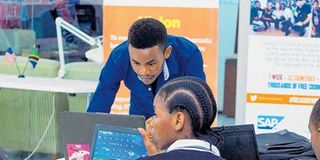Bridging the digital divide

What you need to know:
Things are different for Wilhelm Caspar Oddo. The 30-year-old tech-savvy young man is among a few Tanzanian youth who have turned their passion for ICT into business.
Tanzanian youth love technology very much. However, most of them love using Information and Communication Technology (ICT) as end users rather than being innovators.
Things are different for Wilhelm Caspar Oddo. The 30-year-old tech-savvy young man is among a few Tanzanian youth who have turned their passion for ICT into business.
“Because I was exposed to the world of technology very late, I felt I was obliged to do whatever I can to ensure young people get the exposure from a younger age. I know what it is like having a passion in technology without access to resources, knowledge and the right people to guide you,” says the father of two.
Through his NLab Innovation Academy, Wilhelm offers Tech training to children and youth aged between 10 and 20 years. The Lab incubates and mentors young people who are creative and have projects or ideas with the purpose of solving community problems.
The academy aims at building projects intended to bridge the digital divide, eliminate social exclusion, promote independent living, enhance social, educational and employment opportunities for young people.
“Young people are encouraged to meet academic challenges with openness, enthusiasm and a willingness to solve problems. A good example is Mtaa Kwa Mtaa website (www.mtaakwamtaa.com), which is a real estate website that conveniently connects house owners, buyers and renters,” he explains.
Wilhelm says the idea to do this was born after he met a friend from America, Zoe Flanagan.
Establishing NLab
“When I was a student at Kampala International University in late 2009, Zoe had the opportunity to have an audience with Jon Gosier, the founder of Appfrica and WoundMetrics. After the encounter, he shared with me what he had learnt from the meeting. It is from that point that I started thinking outside the box,” recalls Wilhelm.
After a brief discussion, Zoe offered him a temporary job to work on his new website. His main duty was to translate a few pages on his website from English to Kiswahili.
“John Gosier and his Appfrica made me realise that there is more in African youth than seating in class waiting to do exams, interviews and jobs. That’s when I started thinking of coming up with projects to help young people who are in school and college to learn from their peers and learn from each other,” explains Wilhelm.
Wilhelm established OUFLab, which worked as an open space/hub for university students to work, network and get trained. Later he changed OUFLab to NLab.
Running OUFLab was a challenge since all the services were offered free of charge. In 2013, he decided to refine the objectives of the programme and this was after a very long discussion with his then fiancée, Carolyne Ekyarisiima , now his wife. With her help on running the programme, they managed to change the goals and objectives of OUFLab (now NLab).
“My old friend Zoe brought in the idea of using crowdfunding websites to raise money. Zoe was aware of the project (OUFLab) since day one and knew how passionate I was about it and how I struggled to get funding to realise my dream. Together we were able to raise $3,000 (about Sh6.75million) which we used to buy a few computers and furniture for the Lab. That is when we changed the name from OUFLab to NLab,” explains Wilhelm.
Tackling lack of funds challenge
Apart from the Innovation Academy, Wilhelm is also the co-founder of Ushauri website (www.ushauri.africa), established in 2016 after he attended the Young African Leadership Initiative (YALI) in Nairobi, Kenya. This is a signature effort to invest in the next generation of African leaders. “I met four amazing individuals with whom we decided to start a virtual mentorship programme, facilitating the connectivity of students with experts who work as mentors in the same field,” he says.
In the platform, mentors introduce students to professional experiences beyond the classroom.
“We have decided to start in Tanzania and I am the one in charge of the project. We are in the final stage of launching the programme to university students and emerging entrepreneurs in the country,” he adds.
Wilhelm, who is also a training manager and mentor at Apps and Girls, says lack of access to adequate information concerning different opportunities in and outside the country is one of the challenges most Tanzanian youth are currently facing.
“You meet young people who have plenty of ideas worth millions of money. If you ask them why they have not implemented their ideas, the common answer will be lack of funds,” he observes.
This being an obstacle, Wilhelm decided to address the problem by creating a simple website (www.niwezeshe.com) and a mobile app called Opportunity App, which allows people to view and access different opportunities that are available across the world.
On the other hand, he sets aside a few hours to help people, especially university students on how to apply different opportunities which are accessible through the App.
Wilhelm says the World Wide Web and the internet in general, have never failed him.
“I’m gratefull for that. I feel proud that there are people outside there who can benefit from what I have been doing,” he says.
“I try to share or post content online. I write for both parents and children and share relevant information, images and materials so that young people, especially students can learn something,” he adds
Brief background
Wilhelm is the second born in a family of three boys. He was born in 1988 in Mbeya Region. He is husband to Caroline Ekyarisiima and father to two boys; 5-year-old Caspar Ayden and his 2-year-old brother, Carlson Ellis.
Email: [email protected]




